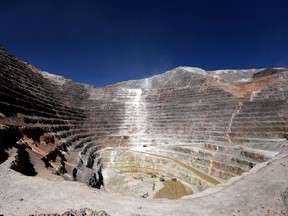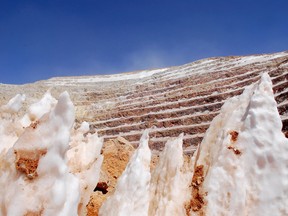BAD CANADIAN MINER
Barrick Gold under fire by UN for toxic spills from Veladero mine in ArgentinaUN letters express concern about impacts on local population’s health and environment
Author of the article: Gabriel Friedman
Publishing date: Nov 17, 2022 • POSTMEDIA

An open pit at Barrick Gold Corp.'s Veladero gold mine in Argentina's San Juan province.
PHOTO BY MARCOS BRINDICCI/REUTERS FILES
Canadian miner Barrick Gold Corp. is once again under fire for its environmental track record and relationship with local communities in the Andes Mountains.
On Tuesday, the United Nations released letters that three advisors to its Human Rights Council — independent experts known as special rapporteurs — wrote in September to Toronto-based Barrick, the Canadian government and others, expressing concern about toxic spills from the Veladero mine in Argentina, which it owns jointly with China’s Shandong Gold Group.
Between 2015 and 2017, mercury and other contaminants were detected in the river system next to the mine, located at high elevation in northwestern Argentina, near the border with Chile. The mine, which uses heap leach processing in which ore is piled on a concrete pad and rinsed with cyanide to extract gold and silver, was linked to three spills and Barrick paid millions of dollars in fines.
Afterwards, the spills appeared to stop. But in June the Financial Post reported that members of nearby communities and local journalists leveled accusations of new spills of mercury and other heavy metals into local waters, in 2021 and 2022, citing data collected by scientists at a university in Mendoza.
The UN special rapporteurs’ letter to Barrick characterized the accusations as “sufficiently reliable” and expressed concern about the impacts on the local population’s health and to the environment.
“While we do not wish to prejudge the accuracy of these allegations, we wish to express our grave concern about the impact on human rights caused by spills of cyanide, arsenic, mercury and other hazardous substances from the Veladero mine,” the letter states. “The lack of effective response by your company exacerbates these impacts.”
It is signed by Marcos Orellana, a UN Special Rapporteur on human rights and hazardous substances and wastes; Fernanda Hopenhaym, chair-rapporteur of the Working Group on Human Rights and Transnational Corporations; and David Boyd, UN special rapporteur on human rights and the environment, who is also a professor at the University of British Columbia.

Canadian miner Barrick Gold Corp. is once again under fire for its environmental track record and relationship with local communities in the Andes Mountains.
On Tuesday, the United Nations released letters that three advisors to its Human Rights Council — independent experts known as special rapporteurs — wrote in September to Toronto-based Barrick, the Canadian government and others, expressing concern about toxic spills from the Veladero mine in Argentina, which it owns jointly with China’s Shandong Gold Group.
Between 2015 and 2017, mercury and other contaminants were detected in the river system next to the mine, located at high elevation in northwestern Argentina, near the border with Chile. The mine, which uses heap leach processing in which ore is piled on a concrete pad and rinsed with cyanide to extract gold and silver, was linked to three spills and Barrick paid millions of dollars in fines.
Afterwards, the spills appeared to stop. But in June the Financial Post reported that members of nearby communities and local journalists leveled accusations of new spills of mercury and other heavy metals into local waters, in 2021 and 2022, citing data collected by scientists at a university in Mendoza.
The UN special rapporteurs’ letter to Barrick characterized the accusations as “sufficiently reliable” and expressed concern about the impacts on the local population’s health and to the environment.
“While we do not wish to prejudge the accuracy of these allegations, we wish to express our grave concern about the impact on human rights caused by spills of cyanide, arsenic, mercury and other hazardous substances from the Veladero mine,” the letter states. “The lack of effective response by your company exacerbates these impacts.”
It is signed by Marcos Orellana, a UN Special Rapporteur on human rights and hazardous substances and wastes; Fernanda Hopenhaym, chair-rapporteur of the Working Group on Human Rights and Transnational Corporations; and David Boyd, UN special rapporteur on human rights and the environment, who is also a professor at the University of British Columbia.

Barrick Gold Corp.’s gold, silver and copper mines in Argentina’s Andes mountains in Veladero, San Juan.
PHOTO BY DIEGO LEVY/BLOOMBERG NEWS FILES
Letters were also sent to Shandong Gold, which purchased a 50 per cent stake in the mine in 2017 for US$960 million, to the Chinese government, and to the joint venture company, Minera Argentina Gold SRL, that operates the mine.
The UN releases letters 60 days after receipt but Barrick provided the Financial Post with a copy of its response, which denies nearly all the allegations.
The company said in its reply that it did not spill any contaminants into the environment in 2022, and added that the impacts of three historical spills were overstated because they “did not impact the environment or human rights.”
RECOMMENDED FROM EDITORIAL
Letters were also sent to Shandong Gold, which purchased a 50 per cent stake in the mine in 2017 for US$960 million, to the Chinese government, and to the joint venture company, Minera Argentina Gold SRL, that operates the mine.
The UN releases letters 60 days after receipt but Barrick provided the Financial Post with a copy of its response, which denies nearly all the allegations.
The company said in its reply that it did not spill any contaminants into the environment in 2022, and added that the impacts of three historical spills were overstated because they “did not impact the environment or human rights.”
RECOMMENDED FROM EDITORIAL

Barrick facing new allegations of contamination near Veladero mine in Argentina

Barrick forges closer ties with Chinese partner in bid to revive South American mine

Chile's political shift to the left may raise risks for Canada miners
It added that mercury and other metals found in local waters “naturally occur in the region,” and noted that cyanide — which it uses to rinse ore — was not found in the water. The company also said it rejects accusations that it did not effectively communicate the previous spills to authorities and local communities.
Still, Saúl Zeballos, who lives in San José de Jáchal, a community of 21,000 about 200 kilometres downstream from the mine, said he blames Barrick for breaking its promises to protect the local water supply. He added the company has not met local expectations of providing jobs.
Zeballos said Barrick never alerted the community to the original spill in 2015, which he only heard about informally through connections in the community. Since then, everyone has been drinking bottled water, but continue to use the local water for cooking and washing despite concerns about the health impacts, especially for their children.
They need to leave and leave the area in the same condition as when they got hereSAÚL ZEBALLOS
“They need to stop polluting the area,” Zeballos said in an interview during which his comments were translated from Spanish by two translators provided by Earthworks and MiningWatch Canada. “They need to leave and leave the area in the same condition as when they got here.”
Barrick initially developed the Veladero mine in 2005. Within several years, it started building a second mine several kilometres away, straddling the Argentina-Chile border, known as Pascua-Lama. But in 2017, Chilean regulators ordered Barrick to halt all mining after finding adverse impacts on the environment.
Meanwhile, Argentina has passed legislation that says a mine that commits three environmental infractions can be forced to close.
The UN advisors’ letter to Barrick cites “information” it received from unnamed sources summarizing four spills linked to Veladero between 2015 and 2022:
in 2015, a valve broke, releasing millions of litres of water containing cyanide and other heavy metals into five rivers, resulting in a US$10 million fine;in September 2016, ice damaged a pipe, and elevated levels of mercury were detected in the local river. Local government suspended mining operations, but mining resumed the next month;in March 2017 another pipe ruptured. The company paid an additional $5.6 million in fines for the September and March spills, according to the letter;this past June, a journalist in Argentina reported that scientists at the National University of Cuyo in Mendoza analyzed local water samples and found that the level of mercury, aluminum and manganese exceeded health standards set by the World Health Organization.
The letter to Barrick does not address whether any regulators or government officials in Argentina are taking any action at present. It says the impacts on local communities’ health were a serious concern; it also notes concern about the impact on the local environment, including the San Guillermo Biosphere Reserve.
“We are also concerned about the company’s failure to report these spills in a timely manner,” the letter states. “The lack of timely information hinders the adoption of protective measures for the populations exposed to toxic substances in the spills and the environment.”
(ESG) is skewed towards environmental concerns at the expense of social and governanceMARK BRISTOW
Last year, the mine produced 172,000 ounces of gold. In October 2021, Barrick announced it would create a trust fund for community development projects near the mine, financed by 1.5 per cent of all gold sales from Veladero.
Last week, on a third quarter earnings call with analysts, Barrick chief executive Mark Bristow said the company had recently built new pads for its heap leach operations and alluded to some difficulties.
“We are still getting our heads around the geomet and leach dynamics, which we believe have also been exacerbated by the abnormally long winter and freezing of part of the pads,” he said, without offering further details.
Repeating a message he has emphasized previously, Bristow also said on the call that he believes that ESG — the catch-all term to evaluate a company’s environmental, social and governance track record — “is skewed towards environmental concerns at the expense of social and governance.”
They’re completely destroying the waterSAÚL ZEBALLOS
His company is focused on investing in impoverished regions to help resolve local poverty, he said.
According to Barrick’s disclosures about payments to foreign governments, in 2021 the company paid US$170,000 in taxes in Argentina. In 2020, the company paid US$210,000 in taxes and US$12 million for infrastructure improvements in the country.
Zeballos, the resident of San Jose de Jachal, objected to the idea that Barrick was making a large economic difference in the community, saying the company’s environmental legacy would be pollution.
“They’re completely destroying the water,” he said through the translators.
• Email: gfriedman@postmedia.com | Twitter: GabeFriedz
No comments:
Post a Comment